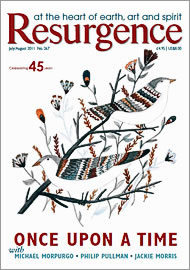This year is the 100th anniversary of the birth of E.F. Schumacher, who was an economist with a difference. He was the embodiment of wisdom and pragmatism: a thinker as well as an activist, an idealist as well as a realist. And he was a great storyteller too, often starting his public talks with a little metaphorical tale.
I particularly remember the story he liked to tell about two monks who were unsure about whether they could smoke and pray at the same time and so decided to consult with their abbot.
The abbot told the first monk yes, and the other monk no.
Why?
Because the monk he told no had asked: “Can I smoke when praying?” whilst the other monk had asked: “Can I pray when smoking?”
Schumacher wrote regularly for Resurgence, contributing a total of 35 articles over a 10-year period from 1966 to 1976, with the first appearing in our second-ever issue. (These articles have now been published all together in a book called This I Believe.)
His most memorable and groundbreaking essay, Buddhist Economics, was published in Resurgence 11 in 1968. That was a revolutionary year: the students were in a radical mood against the war economy of the capitalist system and against exploitation of people and the destruction of Nature. However, they had very little idea of a viable alternative with which to replace the gross materialism of the modern economy.
At that point, Schumacher introduced the idea of Buddhist economics, according to which the essence of civilisation was not in a multiplication of wants, but in the purification of human character. And when his peers wondered what Buddhism had to do with economics, Schumacher answered: “Economics without values is like words without meaning, food without nutrition or sex without love.”
The prefix ‘Buddhist’ was a metaphor, of course, for a moral economy: one built on the firm foundation of ethical and spiritual values. Schumacher was perhaps the first Western economist from a prestigious academic background (Oxford University) who dared to put those two words together – ‘Buddhist’ and ‘economics’. His essay, which we are delighted to share in Resurgence once again, became an instant classic.
Schumacher soon realised that Buddhist economics can only be applied on a human scale if principles of Right Livelihood and human wellbeing are made paramount, a realisation that led him to the idea of small is beautiful, intermediate technology, and the study of economics as if people and planet mattered.
In truth, for Schumacher, economics was a means to an end – its true aim was to enable people to live peacefully within themselves, with their fellow human beings of all races, religions and nationalities and, moreover, with the planet Earth. He believed that this can be accomplished when economics is understood and practised within the context of the human spirit, making the cultivation of wisdom an imperative in human life.
He said: “We are far too clever to be able to survive without wisdom. Therefore the task of our generation is one of metaphysical reconstruction, rather than the endless accumulation of material possessions.”
There is no better way to mark the 100th anniversary of the birth of this inspiring economist and visionary than to revisit and remember the insight of Buddhist economics. At a time when the world is facing an enormous economic and ecological crisis, this wisdom – first expressed by Schumacher more than 40 years ago – can help lead us out of our deep conundrum.
Our summer issue also highlights the power of storytelling, not only as a way of inspiring imaginative solutions to the challenges we are facing but also as a way of strengthening the bond between communities, sharing and spreading new ideas, and even saving lives (see our Frontline story Invisible Children).
And to explore this important theme, we are delighted to once again provide a platform for some of our best-loved and most celebrated storytellers, including Philip Pullman and Michael Morpurgo.







